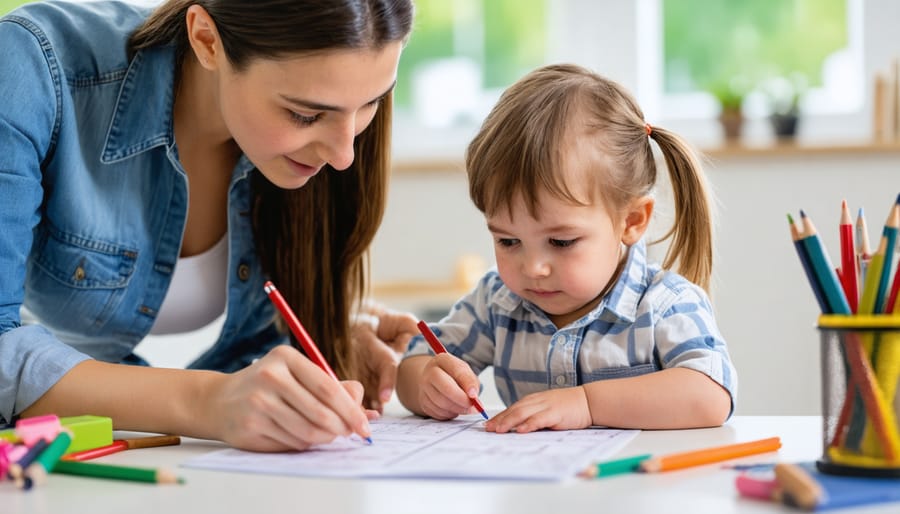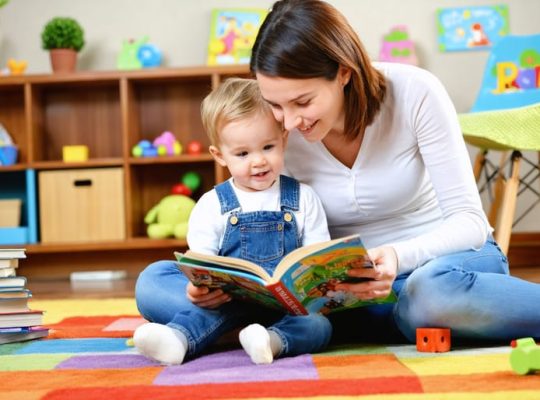Parenting shapes who our children become, yet many of us wonder if we’re making the right choices every day. Research shows that the way we interact with our children creates lasting impacts on their emotional well-being, with some approaches more likely to raise happiest and well-adjusted kids than others. Psychologists have identified four distinct parenting styles that significantly influence children’s development, self-esteem, and future success. Whether you’re strict or lenient, highly involved or hands-off, understanding these parenting approaches can help you make more informed decisions about raising your children. By recognizing your own parenting style and its potential impact, you can adapt your approach to better support your child’s emotional growth and well-being. This knowledge isn’t just theoretical – it provides practical tools for creating stronger, healthier relationships with our children and helping them develop into confident, capable adults.
Authoritative Parenting: Building Confident Kids Through Balance

Key Characteristics
When examining parenting styles, three key characteristics consistently emerge as fundamental elements that shape parent-child relationships: warmth, reasonable expectations, and clear communication.
Parental warmth refers to the emotional connection and nurturing environment parents create. This includes showing affection, offering genuine praise, and responding sensitively to children’s emotional needs. Warm parents make their children feel loved, valued, and secure through both words and actions.
Reasonable expectations involve setting age-appropriate boundaries and rules while maintaining realistic standards for behavior and achievement. These expectations should challenge children to grow while remaining attainable, preventing frustration and fostering a healthy sense of accomplishment.
Clear communication forms the bridge between understanding and implementation. Effective parents express their expectations, feelings, and reasons for decisions in ways children can understand. They also create safe spaces for open dialogue, actively listen to their children’s perspectives, and encourage honest expression of thoughts and emotions.
These characteristics appear in different combinations across parenting styles. For instance, authoritative parenting typically demonstrates high levels of all three characteristics, while authoritarian parenting might show strong expectations but lower warmth and limited two-way communication. Understanding these core elements helps parents recognize their current approach and identify areas for potential growth in their parenting journey.
Impact on Self-Esteem
Research consistently shows that parenting styles significantly impact a child’s self-esteem development. Authoritative parenting, characterized by warmth and reasonable expectations, tends to foster the highest levels of self-esteem in children. These children typically develop confidence in their abilities while maintaining a realistic self-image.
In contrast, children raised by authoritarian parents often struggle with lower self-esteem. The strict rules and high demands, coupled with limited emotional support, can lead to self-doubt and difficulty in learning to help children manage emotions. These children may become overly critical of themselves and hesitant to take risks.
Permissive parenting, while offering emotional warmth, can result in children developing an inflated sense of self-worth that doesn’t align with reality. Without proper boundaries, these children might struggle with self-regulation and accepting limitations.
The neglectful parenting style typically has the most detrimental impact on self-esteem. Children raised in these environments often feel unworthy of love and attention, leading to long-lasting emotional challenges.
Dr. Sarah Chen, a child psychologist, notes: “Children’s self-esteem flourishes when they experience consistent love and support while learning to navigate age-appropriate challenges. The key is finding the right balance between nurturing and setting healthy boundaries.”
Authoritarian Parenting: Understanding Its Effects on Self-Worth

Common Practices
Authoritarian parenting typically involves a strict set of rules and high expectations, coupled with minimal emotional warmth or support. Parents practicing this style often use phrases like “Because I said so” and prioritize obedience over open dialogue. They commonly implement rigid schedules, enforce strict consequences for rule-breaking, and leave little room for negotiation or explanation.
These parents frequently monitor their children’s activities closely, set demanding academic standards, and maintain firm control over daily routines. They might restrict social activities, enforce early bedtimes, and closely supervise homework completion. While they may praise achievement, they often criticize mistakes and shortcomings.
Communication in these households tends to be one-directional, with parents issuing directives rather than engaging in discussions. Children are expected to follow instructions without questioning authority. Common practices include:
– Enforcing rules without explaining the reasoning
– Using punishment rather than positive reinforcement
– Setting high achievement expectations
– Limiting children’s independence
– Maintaining strict discipline
– Showing little flexibility in rules or routines
While these parents often have good intentions and want their children to succeed, their approach can create an environment where children feel pressure to meet high standards without receiving the emotional support needed to process challenges and setbacks.
Self-Esteem Implications
Each parenting style uniquely influences a child’s developing self-esteem, creating lasting impacts that can extend well into adulthood. Children raised by authoritative parents typically develop healthy self-esteem, feeling both loved and capable. These children learn to value themselves while respecting others, thanks to the balanced approach of clear boundaries and emotional support.
In contrast, authoritarian parenting often leads to children struggling with self-doubt and seeking external validation. The strict, punishment-focused environment can make children feel that their worth is tied solely to their ability to follow rules, potentially creating perfectionist tendencies or feelings of never being “good enough.”
Permissive parenting, while loving, may result in children developing an inflated sense of self-importance or struggling with internal regulation. Without consistent boundaries, these children might find it challenging to develop authentic self-worth based on genuine accomplishments and personal growth.
Children of uninvolved parents often face the most significant self-esteem challenges. The lack of emotional support and guidance can leave them feeling unworthy of love and attention, potentially leading to difficulty forming healthy relationships and maintaining self-confidence in later life.
Dr. Sarah Chen, a child psychologist, notes, “A child’s self-esteem is like a garden – it needs the right balance of nurturing and structure to flourish.”
Permissive Parenting: When Freedom Affects Self-Confidence
Style Elements
The permissive parenting style is characterized by high warmth and responsiveness but few boundaries or expectations. These parents act more like friends than authority figures, showing abundant affection and emotional support while being reluctant to enforce rules or discipline. They typically avoid confrontation and prefer to give in to their children’s wishes to maintain peace and harmony.
In practice, permissive parents might let their children set their own bedtimes, choose what to eat, or decide whether to do homework. While they’re excellent at providing comfort during difficult times and celebrating achievements, they struggle with setting necessary limits or helping children develop self-discipline.
This approach often stems from a desire to avoid the strict parenting they may have experienced themselves or a belief that children learn best through natural consequences. While the loving, supportive nature of permissive parenting can foster strong emotional bonds and open communication, the lack of structure can leave children struggling with self-regulation and understanding boundaries.
Dr. Sarah Chen, a child development specialist, explains, “These parents have wonderful intentions and create a loving environment, but children also need gentle guidance and appropriate limits to develop crucial life skills.”
Effects on Self-Esteem
Parenting styles significantly influence how children develop their sense of self-worth and confidence. Children raised with clear, consistent boundaries tend to develop healthy self-esteem, as they understand expectations and feel secure within their environment. When parents balance warmth with appropriate limits, children learn to value themselves while respecting others.
Dr. Sarah Thompson, a child psychologist with 20 years of experience, notes: “Children need boundaries like gardens need fences – they create safe spaces to grow and explore.” Without proper boundaries, children often struggle with uncertainty and anxiety, which can lead to decreased confidence and difficulty in decision-making.
Research shows that children from permissive households, where boundaries are loose or inconsistent, may develop an inflated sense of entitlement or, conversely, feel insecure about their capabilities. Those raised in authoritarian environments with rigid boundaries often struggle with low self-worth and difficulty expressing themselves. Meanwhile, children from neglectful homes, where boundaries are absent, frequently battle with self-doubt and trust issues.
The authoritative parenting style, which combines firm boundaries with emotional support, typically produces the most positive outcomes for self-esteem. These children learn to trust their judgment while understanding their limitations, developing resilience and healthy confidence that serves them well into adulthood.
Uninvolved Parenting: Addressing Self-Esteem Challenges
Identifying Patterns
Recognizing patterns of low responsiveness combined with low demands in parenting can help identify areas for growth and improvement. Parents exhibiting this style often appear disconnected from their children’s emotional needs and set few boundaries or expectations. This might look like minimal involvement in daily activities, inconsistent rule enforcement, or limited emotional support during challenging times.
For example, a parent might regularly miss school events, show little interest in their child’s friendships, or avoid conversations about feelings and experiences. When children face difficulties, these parents might dismiss concerns with “you’ll figure it out” rather than offering guidance or support.
This pattern often develops unintentionally, sometimes due to personal challenges, work demands, or simply repeating learned behaviors from one’s own upbringing. Sarah Matthews, a family therapist with 15 years of experience, notes: “Many parents who display these patterns aren’t aware of their impact. Once they recognize these behaviors, they’re often motivated to make positive changes.”
Understanding these patterns is the first step toward developing a more engaged and structured parenting approach that better supports children’s emotional development.

Impact Assessment
Research consistently shows that parenting styles significantly impact a child’s self-esteem development. Children raised by authoritative parents typically develop healthy self-esteem, displaying confidence and resilience in facing challenges. They learn to value themselves while respecting others, often becoming well-adjusted adults.
In contrast, children of authoritarian parents may struggle with lower self-esteem and self-doubt. The strict, demanding environment can lead to anxiety and difficulty expressing emotions. These children might develop perfectionist tendencies or fear of failure, requiring support to build confidence in their decisions.
Permissive parenting often results in children with unstable self-esteem, who may struggle with setting boundaries and handling criticism. While they might appear confident, their self-worth often depends heavily on external validation.
Children of uninvolved parents frequently face the most significant self-esteem challenges. They may develop trust issues and struggle with forming healthy relationships. However, with proper support systems and professional guidance, these impacts can be mitigated.
Parents can help boost their children’s self-esteem by acknowledging their feelings, celebrating their efforts rather than just achievements, and maintaining consistent, loving boundaries. Professional counseling can also provide valuable tools for both parents and children to build healthier relationship patterns.
As we’ve explored the different parenting styles, it’s clear that authoritative parenting offers the best foundation for healthy self-esteem. However, becoming a more effective parent is a journey, not a destination. Start by making small, consistent changes in your approach to parenting, focusing on open communication and setting reasonable boundaries with love and understanding.
Remember to validate your child’s feelings while maintaining clear expectations. Try implementing the “connect before correct” principle – take a moment to understand your child’s perspective before addressing behavioral issues. This approach helps build trust and emotional security.
Practice active listening by getting down to your child’s level, maintaining eye contact, and reflecting their feelings back to them. Set aside dedicated one-on-one time daily, even if it’s just 15 minutes, to show your child they matter.
Building parental resilience is crucial as you work on improving your parenting style. Take care of your own emotional needs so you can show up as your best self for your children.
Most importantly, be gentle with yourself. No parent is perfect, and it’s okay to make mistakes. What matters is your willingness to learn, grow, and maintain a loving connection with your child. Your efforts to improve your parenting approach today will positively impact your child’s self-esteem and emotional well-being for years to come.







